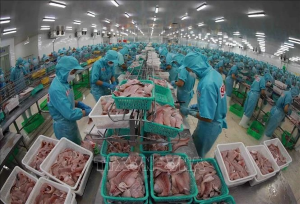
Vietnam’s tra fish export tipped to bounce back: General Department of Customs
Latest
The country raked in an estimated 725 million USD from shipping traffic overseas Vietnamese tra fish exports during the first five months of 2024, up 2 per cent year-on-year, according to statistics from the General Department of Vietnam Customs.
 |
| Tra fish processed at Sao Mai Group. (Source: VNA) |
The US remained the largest buyer, followed by China, Europe, and several South American markets, the Vietnam Association of Seafood Exporters and Producers (VASEP) said, adding the export value of processed tra fish rose 8.5-fold against the same time last year while frozen fillets have been the key export to the US with export turnover of over 120 million USD, rising 19 per cent year-on-year and accounting for 98 per cent of total tra fish shipments to this market.
According to VASEP General Secretary Truong Dinh Hoe, the US’s consideration of recognizing Vietnam as a market economy has brought positive prospects to many economic sectors, including fisheries. If the recognition comes, this would be an advantage for exporters in the upcoming anti-dumping duty reviews on shrimp and tra fish.
As for the European market, tra fish exports in the first five months of the year fell 7 per cent year-on-year to some 70 million USD. VASEP said Germany surpassed the Netherlands to become the biggest importer within the bloc, adding markets recording positive growth during the period including Lithuania (215 per cent, Spain (69 per cent), Belgium (62 per cent), and Greece (46 per cent).
An expert from the association said as tra fish export to the bloc will be affected by the global recession and escalating tension, Vietnamese firms need to capitalize on the EU-Vietnam Free Trade Agreement to better integrate into the market.
Furthermore, they must meet the EU’s green standards on environmental protection and sustainable development so that more products will be able to access the region, the specialist said.
The tra fish sector forecast that exports will expand 10 per cent in Q3 with fuel and logistics costs as well as interest rates cooling down.




















